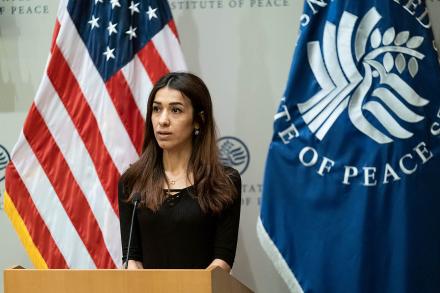A USIP Fact Sheet
Iraq continues to recover from cycles of conflict that have displaced millions of people and caused widespread destruction. As the country rebuilds domestically and reintegrates into the region and the international community, it also needs to improve governance, diversify its economy and address water insecurity, among other challenges. Iraq also continues to grapple with the lasting human legacies of ISIS, including the reintegration of returnees from al-Hol camp in Northeast Syria and internally displaced persons.
The upcoming federal elections in 2025 present challenges and pivotal opportunities for shaping the direction of the country. In a drastically changing region — marked by the war in Gaza and its ripple effects, Saudi-Iran rapprochement, the emergence of a new regime in Syria, and an increased emphasis on great power competition — U.S.-Iraq bilateral relations and collaboration will remain crucial to regional and global stability.
USIP’s Work
Since 2003, USIP has operated uninterrupted in Iraq, providing problem-solving platforms and technical assistance to civic groups and subnational and national government institutions involved in conflict prevention and peacebuilding efforts. USIP’s work in Iraq helps to ensure America’s safety and security by addressing terrorism-related threats, as well as conflict drivers that could lead to a resurgence of violence in Iraq. Current initiatives include helping Iraqis mediate and resolve complex return and reintegration issues in ISIS-liberated areas, including those linked to the stigma associated with returns from al-Hol Camp in northeast Syria; supporting ethnic and religious minorities as they recover from ISIS’s genocide; supporting governance and adaptation, especially related to water insecurity; and informing policy through research, analysis, and convening.
Recently, USIP and its Iraqi partners have conducted dialogue processes and workshops that have prevented the reoccurrence of violence in northern Sinjar district, the site of the genocide committed against the Yazidi (Ezidi) community. USIP has also supported implementing the USIP-brokered Covenant of Confederate Tribal Leaders, a compact agreed to by national-level tribal leaders from 15 of Iraq’s 19 provinces to end conflict-inducing tribal practices that undermine the rule of law. USIP also has supported the Kurdistan Regional Government's efforts on women, peace and security.
USIP’s current work in Iraq can be categorized under three main lines of efforts:
Preventing the Resurgence of ISIS. USIP works to mitigate and prevent the resurgence of ISIS through supporting the returns and reintegration process in Anbar Province, which is the province of origin for the majority of Iraqis residing in Syria’s al-Hol camp. More specifically, USIP’s work focuses on strengthening community cohesion against ISIS and other extremist narratives by facilitating collaboration between government — including law enforcement actors — and communities to address the challenges affecting the return and reintegration process, including those causing tension and conflict. Problem-solving dialogue processes are the core of USIP’s approach.
USIP’s work generates frontline knowledge informing policy, programming and the public on stigma and other barriers to the return and reintegration of Iraqis in Al-Hol, including through conducting original research through its flagship Conflict and Stabilization Monitoring Framework, a survey that gauges community perceptions against over 100 indicators linked to issues of security, justice, governance, reconciliation, and the economy.
Preventing Water Insecurity and Conflict. USIP hosts workshops focused on helping the government of Iraq (GoI) and Kurdistan Regional Government (KRG) actors to strengthen their capacity to address the consequences of water scarcity on social instability. USIP has conducted various research streams on the impact of water scarcity on conflict in Iraq to inform these workshops, including several rounds of research through USIP’s flagship Conflict and Stabilization Monitoring Framework in both Ninewa Province and Anbar Province. Recent USIP-commissioned research explores the political economy of water scarcity and management in five provinces in Iraq and includes a mapping of GoI and KRG actors whose mandates overlap with the issue. The workshops give GoI and KRG actors the needed tools and understanding to address water insecurity and prevent conflict.
Informing Policy and the Public. Leveraging its deep and long-standing experience, networks and work on the ground in Iraq, USIP provides research and analysis on Iraq’s strategic direction, relations with the United States and regional powers, and other matters that affect peace and stability in the country, including global and regional power competition. USIP briefs U.S. and Iraqi government policymakers on practical solutions to Iraq’s challenges in areas of common interest.
Nobel Peace Prize Laureate Nadia Murad
delivered public remarks at USIP on June 28, 2019 on the plight of the Ezidi people, and stabilization and resilience for Iraq’s minority communities.
